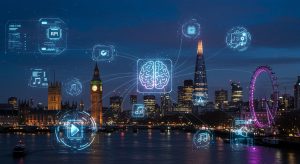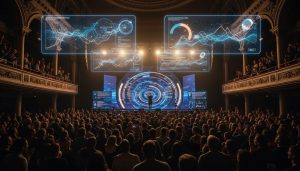Entertainment has always been shaped by the tools audiences have at hand.
From early cinema to live music venues, technology has influenced how people find, enjoy, and share experiences.
In recent years, data and artificial intelligence have started to influence this process, guiding audiences to content that aligns with their preferences while highlighting options they might not have considered.
London, as a global cultural hub, sits at the centre of these developments, with tech-driven entertainment platforms redefining how audiences engage with film, music, gaming, and live events.
Smart Recommendations for Digital Media
Machine learning models now analyse viewing patterns and listening habits to suggest content that matches individual tastes. Platforms can compare hours of user engagement with other audience profiles to identify trends and predict what someone may enjoy next. These systems also collect feedback from likes, skips, and watch completion rates, helping recommendations evolve over time.
Emerging examples show how the same technology used by streaming services can appear in other areas of digital leisure. Some platforms even use approaches reminiscent of those seen on gambling sites not on gamstop, such as observing user behaviour to inform which features or content might appeal to different audiences. Features like feedback loops, adaptive interfaces, and session-based preferences help audiences encounter entertainment suited to their tastes, making it easier to find new experiences with minimal effort.
Data-Driven Events and Live Experiences

Event organisers in London are now using data and analytics to determine which shows are likely to attract audiences. By reviewing ticket sales, social media engagement, and broader local trends, they can better anticipate demand and schedule performances efficiently. Tools can suggest themed evenings, genre-focused series, or pop-up exhibitions likely to appeal to certain groups, helping audiences find events that match their interests.
Venues also use predictive models to inform marketing campaigns. Notifications and alerts are sometimes targeted to users based on previous attendance or online interactions. While not all venues adjust their shows in real time, some immersive experiences can modify lighting, music, or show segments in response to audience interaction, producing performances that feel more personalised and engaging.
AI in Music, Film, and Gaming Platforms
AI is transforming how content is recommended and distributed in music, film, and gaming. Playlists, film suggestions, and game recommendations are informed by algorithms that detect patterns in consumption habits. Music services can highlight tracks alongside popular hits, while film platforms can suggest lesser-known productions that match user interests. Game developers analyse engagement data to adjust in-game events and difficulty levels, helping players find experiences suited to their preferences.
London-based tech firms are experimenting with generative AI to assist artists in producing music or short films efficiently. This allows smaller studios to test creative concepts with limited resources and assess which styles are likely to appeal to audiences. Data-driven insights can also guide distribution strategies, helping creators choose platforms where their work is most likely to reach engaged viewers.
Social Media and Interactive Discovery

Social media platforms are increasingly acting as discovery hubs. Algorithms highlight trending content, rising creators, and interactive posts that attract attention. Users encounter recommendations not only from accounts they follow but also through broader community engagement, creating opportunities to explore content outside their usual interests.
Interactive features, such as polls, live chats, and virtual events, provide additional data to these systems, sharpening predictions about audience preferences. Each interaction contributes to more accurate recommendations, allowing platforms to guide audiences to content that suits their tastes. London creatives are using these insights to design campaigns that combine online promotion with offline events, reaching new audiences in innovative ways.
Conclusion
Data and AI are no longer behind-the-scenes tools; they are influencing how audiences experience entertainment. From personalised recommendations to predictive scheduling, from interactive online platforms to live events, technology helps audiences find content in engaging and efficient ways. London remains at the forefront of this development, with creators, venues, and platforms exploring what data and analytics can offer. As these systems continue to advance, audiences can expect more responsive, relevant, and enjoyable experiences across all forms of entertainment.
Author Profile
- CEO - ClickDo™ & SeekaHost™ | Started as an SEO Consultant and helped over 400 UK business owners grow their business with online marketing and Google advertising. More details about Fernando Raymond are available at www.fernandoraymond.com.
Latest entries
 EntertainmentJanuary 15, 2026Why Investor Interest in Online Casinos is shifting toward mobile-first Platforms
EntertainmentJanuary 15, 2026Why Investor Interest in Online Casinos is shifting toward mobile-first Platforms BusinessDecember 19, 2025Europe‑Focused E‑Commerce from London: Building Niche Consumer Brands in a Fragmented Regulatory Landscape
BusinessDecember 19, 2025Europe‑Focused E‑Commerce from London: Building Niche Consumer Brands in a Fragmented Regulatory Landscape EntertainmentNovember 6, 2025How Data and AI Shape Entertainment Discovery in London
EntertainmentNovember 6, 2025How Data and AI Shape Entertainment Discovery in London Business AdviceNovember 5, 2025How is Blockchain Driving Trust in FinTech Innovation?
Business AdviceNovember 5, 2025How is Blockchain Driving Trust in FinTech Innovation?


